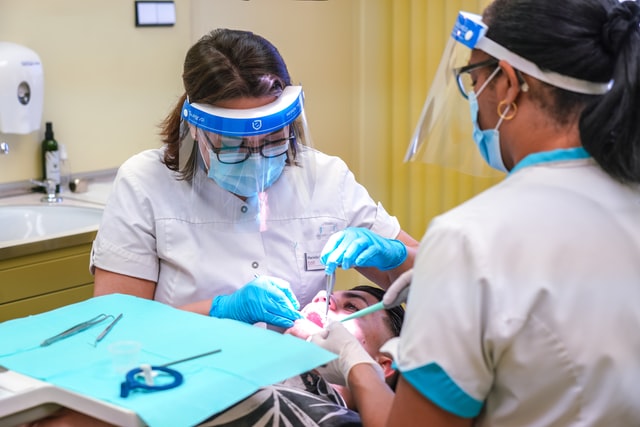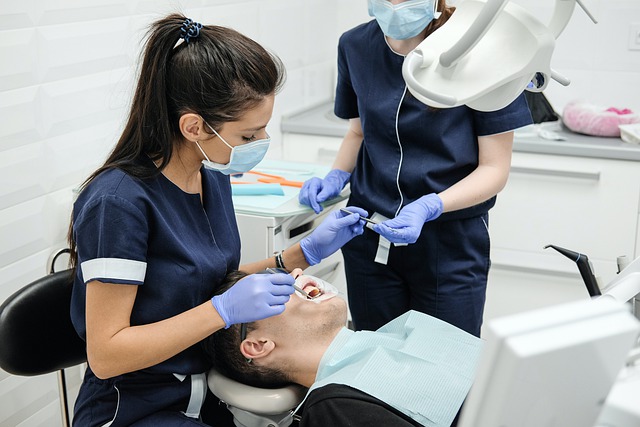What Is Teeth Cleaning?
Teeth cleaning starts at home, but if not done properly, can end up in the dentist’s chair. Brushing and flossing alone isn’t always enough to remove plaque and tartar – although it does help.
It is recommended that you visit a dentist every six to twelve months to remove the plaque and tartar.
However, most people only visit the dentist every two to two and a half years. This gap in dental cleaning can cause serious health problems, and can even result in the loss of teeth.
Certain meals and beverages can stain your teeth. Dental cleaning is effective in eliminating developed stains, resulting in gleaming teeth.
Having your teeth cleaned by a dentist is the best way to brighten up your smile.
Proper Teeth Cleaning Is Important
Teeth cleaning goes beyond just appearance. Maintaining clean teeth is the easiest approach to decrease bad breath. Getting a dental cleaning that goes beyond your regular brushing and flossing improves your oral health and provides you with a cleaner mouth with a fresher breath.
If not proper oral health is not maintained, you might also get cavities. Cavities are prevented by brushing and flossing your teeth twice a day.
Tooth decay is caused by plaque accumulation on your teeth. They erode the enamel off of your teeth, causing cavities.
Dental cleaning in combination with regular brushing and flossing helps to prevent this from happening.
When plaque builds up on your teeth, your teeth and gum line loosen. Gum disease is the most common cause of tooth loss. Teeth are lost as a result of gum disease, which is the main reason for dental decay. Dental cleanings and good oral habits at home can help to avoid tooth loss.
There’s a link between your general health and oral health. Keeping your teeth clean lowers your risk of getting diabetes and heart disease. Dental specialists may discover some medical problems during an oral checkup.
What Do Dentists Do?

Photo Credit: Unsplash
Depending on the severity of the plaque and tartar build-up, a dental hygienist may use a scaler and ultrasonic instrument to clean around your gum line, as well as in between your teeth.
The more tartar there is in your mouth, the more time they’ll need to scale a particular spot. Polishing of the teeth and an application of fluoride is typically also done during a dental cleaning.
Each dentist has their own technique for scaling teeth, but one dentist may use different tools than another dentist might.
For example, dentist A might use a traditional hand scaler and dentist B might use an ultrasonic instrument to scale teeth.
This dentist technique difference is why you should ask your dentist about how they plan on scaling your teeth during a dental cleaning.
The dentist might then begin to mark all the spots that need scaling or polishing before they begin.
Once complete, they will use an ultrasonic instrument for 30 seconds on each tooth to remove any plaque above the gums where brushing could not reach. Then they use a scaler for one minute on each spot marked in step 1.
Afterward, they likely use an electric file and polishing paste on the teeth and also apply fluoride. The dentist will spend another minute scaling off any tartar buildup along your gum line before checking for any missed areas of plaque and tartar.
Using X-ray technology and periodontal probes, they can see below the surface of your gums into deeper pockets that only dental tools can access.
Picking The Right Dentist

Photo Credit: Pixabay
Since teeth cleaning is such a vital part of dental health, it’s important that you choose the dentist who can do this procedure right. Your dentist should be able to give you references from past patients, as well as share their results with you.
Of course, it’s also wise to ask any dentist you’re considering whether or not they feel like they can do a great job scaling and polishing your teeth (based on factors like the shape and size of your teeth).
Be Honest With Your Dentist
It’s also important that you should be open and honest with your dentist about any conditions or issues you’re facing.
He/She may need to adjust the type of dental cleaning they use for your teeth, as well as who else (if anyone) needs to participate in the scaling process.
Although visiting the dentist can be an uncomfortable experience, there are many beneficial reasons why you should visit them once or twice a year.
From losing teeth to bad breath to overall health, one of the best things you can do for your body is to take care of your teeth – and to be honest with your dentist about taking care of them.
There are some things you can do at home to scale teeth, but it’s not recommended due to safety reasons.
You shouldn’t try scaling your own teeth without a dentist around to help if anything goes wrong (and dentist-supervised teeth scaling doesn’t work out). When it comes to your smile, it’s always better to get a professional to help than risk losing a tooth.
As always, consult your dentist or physician if you have any questions or concerns regarding teeth cleaning and keeping your pearly whites as healthy as they can be.
About The Author:
Kenton de Jong is a blogger, web developer, and SEO specialist based out of Regina, Saskatchewan, Canada. When he isn’t working, he’s traveling around the world and visiting some of the strangest places imaginable. He also hasn’t been to the dentist in a few years, and probably should go soon. Statistically speaking, you should too.





